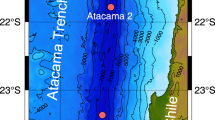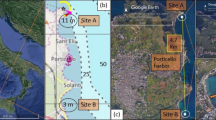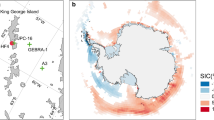Abstract
PREVIOUS determinations of synthetic organic compounds in antarctic snow1 and in tissues of species inhabiting the antarctic marine environment2–5 have shown the presence of DDT compounds in almost all samples examined, but the apparent absence of polychlorinated biphenyls (PCB). PCB, however, are ubiquitous marine pollutants north of the Antarctic Convergence2,5–8 and were detected in all eggs and tissues of seabirds examined from the subantarctic Auckland Islands, centred at 166°05′E, 50°40′S. These data have been used to support the hypothesis that the atmosphere is not the primary medium of transport of this class of pollutants to remote environments such as Antarctica1. In the present paper we report the detection of PCB in the eggs of resident penguin species, by removal of unknown compounds previously interfering in the analysis, and in antarctic snow, by application of in situ extraction in the field of large volumes of melted snow. Equivalent levels and ratios of these pollutants in species resident north and south of the Convergence indicate atmospheric, rather than oceanic, transport to Antarctica.
This is a preview of subscription content, access via your institution
Access options
Subscribe to this journal
Receive 51 print issues and online access
$199.00 per year
only $3.90 per issue
Buy this article
- Purchase on Springer Link
- Instant access to full article PDF
Prices may be subject to local taxes which are calculated during checkout
Similar content being viewed by others
References
Peel, D. A., Nature, 254, 324 (1975).
Risebrough, R. W., in Natn. Conf. Polychlorinated Biphenyls, EPA-560/6-75-004, 230 (Environmental Protection Agency, Washington, DC, 1976).
Risebrough, R., and Carmignani, G. M., in Proc. Symp. Conservation Problems in Antarctica (edit. by Parker, B. C.), 63 (Allen, Lawrence, Kansas, 1972).
Risebrough, R. W., in Adaptations Within Antarctic Ecosystems (edit. by Llano, G. A.), (Scientific Committee for Antarctic Research, in the press).
Risebrough, R. W., de Lappe, B. W., and Walker, W., II, in Marine Pollutant Transfer (edit. by Windom, H. L., and Duce, R. A.), (Heath, Lexington, Massachusetts, in the press).
Bidleman, T. F., and Olney, C. E., Science, 183, 516 (1974).
Harvey, G. R., Miklas, H. P., Bowen, V. T., and Steinhauer, W. G., J. Mar. Res., 32, 103 (1974).
White, C. M., and Risebrough, R. W., in The Environment of Amchitka Island, Alaska (edit. by Merritt, M. L., and Fullers, R. G.), (Energy Research and Development Administration, Oak Ridge, Tennessee, in the press).
Bennington, S., Connors, P. G., Connors, C., and Risebrough, R. W., Environ. Pollut., 8, 135 (1975).
Goldberg, E. D., Proc. R. Soc. Lond., 189, 277 (1975).
Author information
Authors and Affiliations
Rights and permissions
About this article
Cite this article
RISEBROUGH, R., WALKER, W., SCHMIDT, T. et al. Transfer of chlorinated biphenyls to Antarctica. Nature 264, 738–739 (1976). https://doi.org/10.1038/264738a0
Received:
Accepted:
Issue Date:
DOI: https://doi.org/10.1038/264738a0
This article is cited by
-
Cold survival strategies for bacteria, recent advancement and potential industrial applications
Archives of Microbiology (2019)
-
Toxic anthropogenic signature in Antarctic continental shelf and deep sea sediments
Scientific Reports (2018)
-
Responses of microbial community in rhizosphere soils when ryegrass was subjected to stress from PCBs
Journal of Soils and Sediments (2011)
-
Hepatic cytochrome P450 activity and pollutant concentrations in paradise shelducks and southern black-backed gulls in the South Island of New Zealand
Ecotoxicology (2008)
-
Occurrence of organochlorine pollutants in the eggs and dropping-amended soil of Antarctic large animals and its ecological significance
Science in China Series D: Earth Sciences (2007)
Comments
By submitting a comment you agree to abide by our Terms and Community Guidelines. If you find something abusive or that does not comply with our terms or guidelines please flag it as inappropriate.



